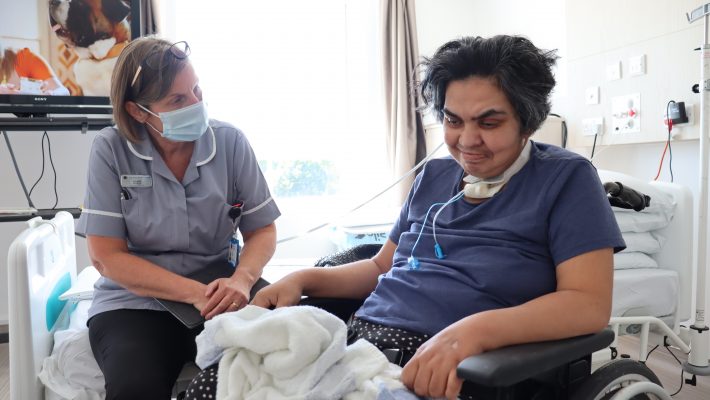Good enteral care by a clinical nurse specialist
Good enteral care given by clinical nurse specialist Louise McIntyre

The Royal Hospital for Neuro-disability in Putney is renowned for hosting a wealth of experience within its walls. The multi-disciplinary approach to the way we care for our patients enhances the hospital’s reputation as a centre of national excellence.
One way in which the RHN excels in its approach to care is through good basic enteral care. Enteral or tube feeding, is a way of delivering nutrition directly to the stomach or small intestine. This is particularly important at the RHN as around 85% of our patients and residents cannot eat or drink normally, meaning the RHN has one of the largest number of patients and residents with a permanent enteral tube under one roof.
A brain injury can impact many essential bodily functions, including a person’s ability to swallow. If one part of the swallowing process goes wrong, then the whole process becomes unsafe. This means our patients and residents are at higher risk of complications like aspiration due to the nature of their injuries or neurological condition. Feeding tubes are fitted and monitored continually to ensure that patients and residents receive their nutrition, water or medicine.
The RHN focuses on patients and residents as individuals, meaning everyone is different when receiving enteral care. Some people are fully tube-fed, whilst others only require their tube for medication or water. This focus on individual needs improves a person’s quality of life through specialised care and allows an adaptive approach to specific needs.
Louise McIntyre, Enteral and Lead Clinical Nurse Specialist (CNS) at the RHN explains,
“Bad practice in enteral care can often lead to infection, and in more severe cases, admission to acute hospitals. The RHN provides unique and tailored enteral training to its staff, reinforcing best practice in order to avoid these unnecessary complications.”
Louise has worked at the RHN for over three years and is highly experienced in enteral care. Louise is a qualified nurse prescriber, meaning she can meet with patients and residents across the hospital to quickly assess their needs and prescribe effective care. The RHN’s multi-disciplinary approach to care means Louise is able to collaborate with dieticians, occupational therapists, physiotherapists and doctors to identify and minimise risks. Having access to these experts allows Louise to work effectively with colleagues in-house, to come up with the best treatment plan when needed for the patients.
“Over COVID-19, having on-site enteral care meant patients did not need to be transferred to acute hospitals. I could host patient reviews and staff training remotely. I was even able to create videos for patients’ families/carers on how to care for gastrostomy sites and feeding tubes. Louise has helped to inform best practice and enhance the quality of life for a number of patients and residents admitted to the hospital.”
Case study of patient A
Patient A’s feeding tube had come out four times in as many weeks. However due to the patient’s brain injury, they did not have any manual dexterity to remove the tube themselves. Louise began investigating why the tube was coming out.
After a joint assessment with the occupational therapist, Louise was able to identify that the incident had been caused by patient’s upper limbs, which were severely contracted. The patient’s arm was pressing downwards on the feeding tube, causing it to become dislodged.
After the issue was identified, Louise was able to change the design of the tube so that the patient’s arm could move over the top of tube safely and without it becoming dislodged. The occupational therapist also adjusted the patient’s arm positioning using strategically placed cushioning, to prevent repeat incidents of tube displacement.
General and NHS hospitals are usually contracted to use certain brands of enteral tubes but as an independent charity hospital, the RHN has the autonomy to trial a number of different makes of tube which allow us to take an individualistic approach to care and which best fit our patient’s needs.